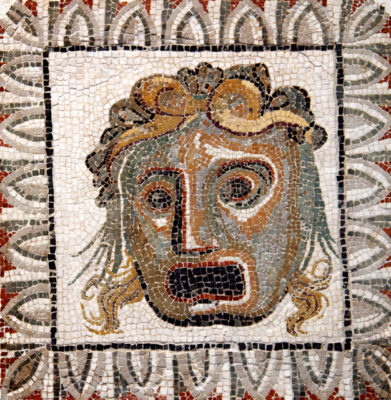
I’ve heard of readers becoming upset when a character they like dies in a story. In a tragedy, characters will die and oftentimes suffer, too. I’m glad Shakespeare didn’t hesitate to let his characters kill each other. Tolstoy’s The Death of Ivan Ilyich made a deep impression on me years ago, and I still remember it. Ivan kind of had to die for that to be true.
Tragic stories are serious, and often intense, and frequently end in the death or downfall of one or several characters. They have a similar arc to that of any other story. The protagonist wants something. He, she, or they set out to try to get whatever it is. Either they don’t succeed, or if they do, there’s collateral damage including death and disaster.
In most tragedies, the protagonist does his or her best, but succumbs to the effects of his or her Tragic Flaw. Sophocles’s Oedipus Rex is a nice, clear example. Oedipus (I’ll call him Ed) tries to do the right thing. When an oracle warns him he is destined to kill his father and marry his mother, he takes steps. He moves far away, on the theory that if he is nowhere near his parents he can’t do them any harm.
On his way, he’s attacked by a group of people and kills one of them. In his far city, Ed falls in love with a woman and marries her. What he didn’t know was that he was adopted. The stranger he killed on the road was his birth father. The woman he later married was his birth mother. When the truth is known, his wife hangs herself and Ed puts out his own eyes.
Granted, this is harsh stuff, but it’s a legitimate genre with a long history.
Tragedies with a revenge theme are common. Hamlet is perfect illustration of the type that was common in its day, featuring a ghost, feigned madness, and a play-within-a-play. Pretty much everybody dies in this one, so if you became attached to any character you’re going to feel it.
In his book, Poetics, Aristotle says, “the plot ought to be so constructed that, even without the aid of the eye, he who hears the tale told will thrill with horror and melt to pity at what takes place.” An effective tragic story will excite these emotions in the reader and then purge them away, having a healing effect.
Aristotle and many of his heirs emphasized plot over character. That may have made it easier for his audiences to part with the slain characters. Modern readers expect fuller character development, and thus require very reasonable and convincing motives for a character’s death.

Larry Paz
Respect your thoughts, but I choose life.
Liz Jameson
I needed to read this TODAY. Very upset since, just yesterday, a main character died in a book I’m reading — don’t want to name the book because it would be a possible spoiler. I was SO upset when this character died…did not see it coming and a friend had said, “The book has a good ending,” so I didn’t think any main character would die. Even if things get better at the end, I’m just devastated by this loss, and for me, there can be no really “happy” ending now. But we’re not promised happy endings; we can hope for “good” endings, where things are brought to a close in a satisfactory way considering what has happened. This is what I’ll have to hope for as I finish the book, which is based on a true story that happened in WWII. (It was WWII, so what was I expecting?) Your blog helped remind me that it’s often just a necessary event in the narrative arc (not to mention an integral part of a true story). Thanks!
Ken Pelham
Thank you, Marie! It’s sad but true (see what I did there?). Tragedy and death provide some of the most powerful stories imaginable. Hamlet. All Quiet on the Western Front. The Grapes of Wrath. A Farewell to Arms. These would not be what they are without the tragedy.